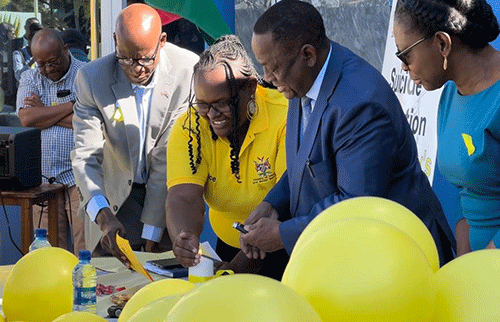Health minister Dr Kalumbi Shangula has pleaded with Namibians to break the culture of silence and seek help, as suicide is a major public health problem, with far-reaching social, emotional and economic consequences.
Programme data from August 2022 to June 2023 indicate that Namibia lost 623 lives to suicide, of which 511 are males and 92 are females.
“Most worrying is the fact that among this number, 20 or 3.2% are from the youth demographic. This illustrates that the death rate by suicide is 21 per 100 000 population, with the highest incidence being experienced in Omusati, Oshikoto and Hardap regions,” said Shangula during the commemoration of World Suicide Prevention Day yesterday.
He stated that these numbers confirm that suicide is a major public health concern in Namibia and must serve as a call to action to prevent further incidences of suicide.
He said: “Some mental health
conditions are associated with an increased risk of suicide. Persons with depression, bipolar disorder and schizophrenia especially have a high propensity to suicide. Apart from mental health conditions, contributing factors to suicide include substance abuse, chronic health issues, persistent pain or physical disability, feelings of isolation or helplessness and negative life events”.
Shangula highlighted that although suicides are preventable, efforts require coordination and collaboration among multiple sectors of society, including the health sector and other sectors, such as education, labour, agriculture, business, justice, law, defence, politics and the media.
He said the efforts must be comprehensive and integrated, as no single approach alone can make an impact on an issue as complex as suicide.
“A crucial part of suicide prevention is addressing the stigma associated with mental disorders that in turn trigger suicide. Any person with suicide ideations, any person thinking of or talking about taking his or her own life or any person who has attempted suicide deserve to get the help they need,” said Shangula.
The World Health Organisation acting country representative Dr Mary Bruntao said, globally, an estimated 703 000 people die by suicide each year, among which 77% of the deaths occur in low-middle-income countries.
“These global suicide rates are a serious public health concern. Every life lost to suicide creates a devastating impact on families, communities and nations. Namibia’s suicide rate for the past three years is estimated between 19-21 per 100 00 population.
The majority are male, and the method mostly used was by hanging,” explained the medical doctor.
Bruntao stated that preventing suicide requires collective action from all of us if we are to achieve the sustainable development goal target of reducing global suicide mortality by one-third by 2030.


